Avvaiyar – She Sacrificed Beauty and Youth
“I don’t know how much longer I can continue living this life of a balladeer.” She thought as she trudged slowly towards Madurai, fatigue combined with something incomprehensible and new on her mind and body.
“I think I’ve done enough for the world of Tamil. Now I will stop, find a permanent place and rest till the god of death comes calling,” she murmured to herself, reminiscing about her days of carefree youth.
Seeing a big boulder, she sat down to rest. She had a few more hours of travel before she reached Madurai. The trickling of a stream nearby reminded her of her thirst. She quickly followed the sound, found the clear stream, and had a nice, deep drink of sparkling water.
She felt slightly rejuvenated and sat down on the roots of an old tree to rest some more. She looked up and realised it was a jamun tree filled with lush, purple fruits. But they were all beyond her reach.
Sighing, she said aloud, “I’ve given so much and yet when I need something, I don’t have anyone to help me.”
Out of the blue, she heard a voice from above.
“What, Paati? What are you complaining so much?”
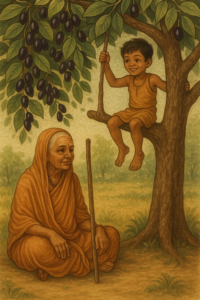
Startled, she looked up and found a young boy of about 10 years, sitting astride a branch of the jamun tree, swinging his legs, a smile on his face, and a strange twinkle in his eyes.
Seeing the young boy, she regained her sense of ease and returned to her complaining ways.
“Nothing, my dear. You’re just a boy, and there’s so much more to see in the world, a lot of suffering, plenty of sacrifice, and so little happiness. By the way, who are you and what are you doing here, in this thick jungle?”
“I’m just a shepherd, come to herd my cattle. They are grazing in the jungle. I’m waiting here for their return, late in the evening. Since I have a lot of time, tell me your story, Paati. I would love to listen.”
Enthused by the child’s innocent desire and her own need to talk, the old lady started her narrative.
“Even as a child, I was not interested in worldly pleasures. I chose to devote my entire life to religious pursuits and to spread awareness about Tamil through songs and poetry. My parents wanted me to get married and lead a life like any other normal girl. But I wasn’t interested in that at all. Tired of trying to convince me, one day, they chose a groom for me without my permission, and fixed a wedding date. I was flummoxed, and a wee bit angry.” She paused for a while, lost in old memories.
“But why anger, Paati? Isn’t it natural for parents to think of their daughter’s marriage when the time is right? Even gods marry and have children, no?”
A little startled at the boy’s wise question, she said, “That may be a natural thing to do. But you see, my dear boy, I always knew I was born for something bigger, something greater, not just the things that normal people do,” replied the old lady, her voice bleeding with pride as she compared her above-normal existence to the ordinariness of everybody else.
The boy smiled knowingly, “Bigger, greater! That sounds so nice, Paati. What great things did you do?”
Returning his smile, Paati said, “I was telling you about the marriage my parents had arranged for me? Well, there was no way I’d let that happen. I prayed hard to Lord Ganesha (here, the young boy smiled knowingly), who appeared before me. I told him to grant me such a boon that not just this marriage proposal, but no one would want to marry me. The Son of Shiva told me he’d give me an old, wizened physical body, one that no man would want to wed. I was so happy with his idea. I agreed readily.”
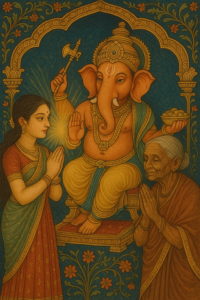
“I see! That truly calls for a great sacrifice.” Even though Avvaiyar didn’t see it, the boy’s voice reeked of sarcasm.
“Indeed, it was a sacrifice. But I’m happy I did it, dear child,” Paati said, her eyes twinkling with pride.
“If you’re happy you did it, and did it willingly, and in fact you actually wanted it, then how can you call it a sacrifice?” The boy countered.
The young lad’s question stunned Paati. She had the grace to feel a wee bit ashamed of herself for not having the wisdom to think like this young boy. How did he think of it, something so obvious that escaped her mind? She struggled to respond to his question.
“Okay, leave it, Paati. Tell me more about your achievements,” the boy urged her to share more of her life story.
Avvaiyar and the Athiyamaan Chieftain – the Rare Gooseberry
“You know, Vallal Athiyamaan Nedumaan Anji, the present chieftain of Thagadur, from the ancient Athiyamaan clan?”
“Who doesn’t know of the present chieftain and his virtuous and courageous ancestors, Paati? The Athiyamaan clan have been ruling over their kingdom for over three centuries now. And I have heard the present chieftain is living up to his ancestors in terms of bravery, strength, and compassion towards his subjects?”
Again, Paati was surprised how such a young boy, and that too, a mere cattle-grazer, would know so much. But she was too caught up in her own life and stories to ponder excessively on the boy. She said, “Yes, you are right. I am Nedumaan Anji’s court poet, and he is so impressed with my Tamil skills and the lyrical beauty of my poetry that he gave me a special gooseberry given to him by a famous siddhar. This gooseberry is believed to prolong life. You know what he told me when he handed over this rare fruit?”
The boy said, “How will I know if you don’t tell me? Do you think I am a god to see and know everything?”
The old lady laughed condescendingly at the lad’s self-mocking and continued, “Indeed, you are just a young boy struggling to help his parents make ends meet. How will you know anything?”
She didn’t see the young boy’s eyes twinkling in merriment at these words. She continued her story, lost in her memory. “The chieftain said, ‘You should eat this fruit, Avvaiyar, because your life is more important than mine. My stories of war will be lost sooner. But your poetry should last forever in the hearts of men and women.”
The pride in the old woman’s face was unmistakable. She gave the boy a patronising look and said, “Isn’t that a great reward for my hard work and intelligence?”
Avvaiyar Learns Her Lesson
Even as the boy nodded in agreement, she continued, “But you know, these days I feel I’ve done enough for the good of Tamil and her people. It is time to hang up my boots and work towards self-preservation. Anyway, people are not very grateful for the work I do. I deserve a lot more than what I have got.”
After a pause during which time the boy stared at the lady with a strange glint, he asked, “You look hungry. Do you want some jamun, Paati?”
“Yes, yes. I was so lost in my stories that I almost forgot my hunger. Please can you pluck me a few fruits?”
“Sure, Paati. Do you want sutta pazham or sudaatha pazham?”
How can fruits be roasted or unroasted? Yet, he must be asking for some reason. He seems to be from this region and must know something about the jamun that grows here? Let me just give him an answer. All the fruits look juicy and delicious. Any answer I give, he is bound to give me the same fruits?
She said aloud, “Give me the unroasted ones, my dear boy.”
The boy shook the tree hard, and many fruits fell to the ground. “Pick any that you like, Paati.”
Avvaiyar picked up a few from the ground and gathered them in her saree pallu. She then sat down on a thick tree root and took one from her collection. There was sand on the fruit, and so she blew it.
The voice of the boy came from above, “The fruit is hot or what, Paati?”
Avvaiyar Seeks Pazhamudircholai
In an instant, Avvaiyar realised she was talking to the God of Tamil. She stood up, letting all the fruits scatter to the ground, and prostrated before the lad, saying, “I am sorry for not realising who you are. And I am sorry for my misplaced vanity and arrogance in my knowledge. Please show yourself, O Muruga.”
The boy smiled joy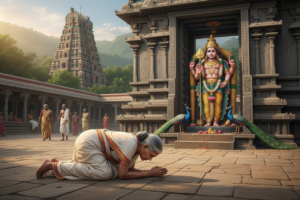 ously and revealed his true self, Skanda, the Patron God of Tamil. He blessed Avvaiyar and said, “Even wise and learned people like you need help dealing with the illusion of vanity and pride. And you needed just a little ‘hot’ push, my dear Paati. May you and your Tamil poetry always be remembered.”
ously and revealed his true self, Skanda, the Patron God of Tamil. He blessed Avvaiyar and said, “Even wise and learned people like you need help dealing with the illusion of vanity and pride. And you needed just a little ‘hot’ push, my dear Paati. May you and your Tamil poetry always be remembered.”
“I am grateful to my vanity, my dear Skanda. Otherwise, I wouldn’t have had the honour of your grand vision and this enlightening conversation. It is my life purpose to spread the beauty of Tamil across the land, and I will do so until my very last breath. I have one small request, Lord.”
“Name it, Avvaiyar Paati.”
“Let this hallowed place be called Pazhamudircholai, in honour of your lesson using the idea of a hot and roasted fruit. Please reside here so that people may come and worship you.”
“Thathasthu,” said Skanda.
Glossary:
Paati – Tamil word for grandmother – used to address old ladies also
Pazham – Tamil word for fruit.
Sutta – has two meanings in Tamil – roasted and hot
Sudaatha – has two meanings – unroasted and cold
Thathasthu – Sanskrit word for “so be it”
Muruga, Skanda – two of many names of Kartikeya, the second son of Shiva and Parvati, according to the Skanda Purana, which is highly prevalent all over South India, particularly Tamil Nadu.
Author’s Note:
Pazhamudircholai is one of the six temples of Muruga, collectively referred to as Aarupadaiveedu. The stories of the Aarupadaiveedu appear in the Skanda Purana. The earliest known work recording the stories of Aarupadai Veedu is believed to be Thirumurugaatrupadai by a legendary poet called Nakkeerar, also called Nakkeeranar, believed to have been written somewhere between 3BCE and 3 CE, during the Sangam Era and/or post-Sangam Era.
This blog post is part of ‘Blogaberry Dazzle’
hosted by Cindy D’Silva and Noor Anand Chawla.

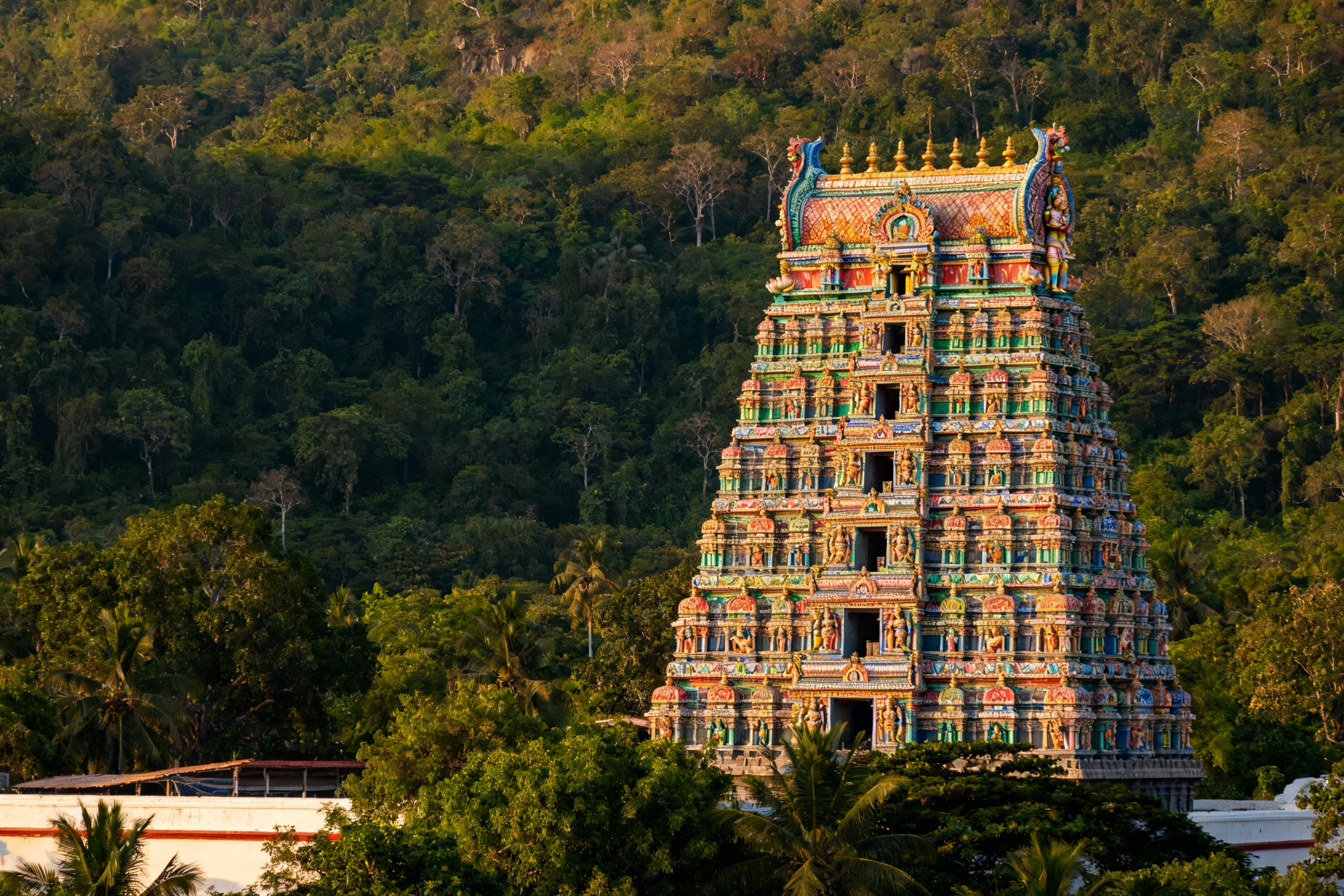
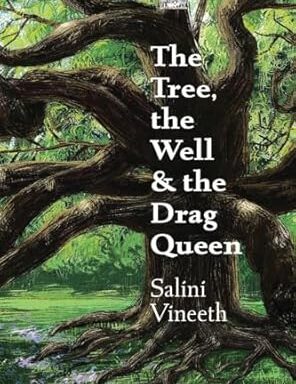
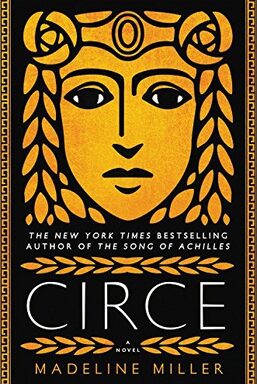
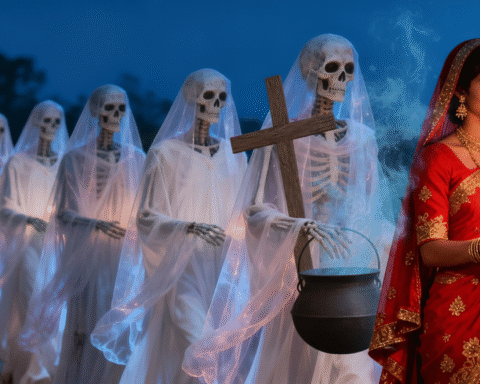

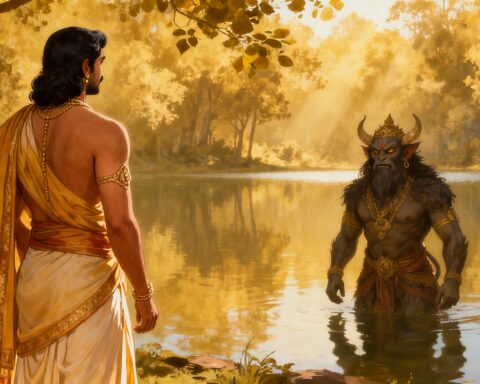
I appreciated how you showed that even legends can remind us about pride, learning, and respect for mystery. The mix of forest-hill setting, the old Naaval tree, and divine disguise felt almost cinematic. Thanks for retelling this story so vividly.
I only knew about Avvaiyar as an old woman who was famous for her poems , today you brought the whole story to my wonderment. It was a sacrifice to give away her you but she was very cutely chastised by Lord Muruga for her vanity too. Lovely and enjoyable narration.
Loved this post. Will share it with my parents and on LinkedIn.
Thank you so much, Aishwarya.
Superb Ratna…. You have a knack of picking some interesting stories of our ancient times and express and write so well… Keep going.
You pick such interesting tales to share, Ratna. Are these temples still there, or are they just there in mythology? I thought in those times, petty vices like vanity or pride would not be there, but Avvaiyar gave up her youth for not getting married but is vain about her poetry and life she is leading.
What a beautiful tale. I loved the lesson on humility and the gods coming to remind you that the head that remains grounded lives forever. I hope we remember this at every turning point in our lives.
Reading your posts is like reading a fascinating Mythological book. So much to learn, and thanks to your posts, I am learning.
I love how you brought Avvaiyar’s story to life — her wisdom and humility feel timeless.
This is a fascinating new story for me. Humility is one of the most important characteristics one must possess and God made Avvaiyar realise that.
This is the first time I’ve read this story. It beautifully signifies the virtue of humility.
I knew this story but didn’t know this is the reason why Pazhamudircholai got its name. Wonderful story, Ratna. Thanks for sharing.
Interesting. Didn’t know about Shutta pazham and Shudatha pazham story. The sentence about sacrifice was so so beautiful and relevant too
What a beautiful tale and love your narration and the way you preserve and introduce new generations to the rich tales.
This beautifully narrated piece on Pazhamudircholai and Avvaiyar blends history, devotion, and folklore with such warmth. I loved how you connected cultural roots with timeless wisdom, making the story engaging, informative, and deeply meaningful for readers today.
This is one of my favourite stories and I loved your retelling.
Avvaiyar’s story is profoundly moving. Her dedication, sacrifices, and eventual humility before divine wisdom beautifully illustrate the balance between pride and purpose, teaching that true greatness lies not in accolades, but in devotion, learning, and the courage to serve.